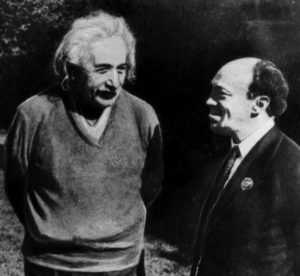Two Math Wizards
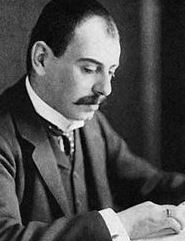
Edmund Landau
Edmund Georg Hermann Landau (1877-1938) was born in Berlin. As a young boy, he was recognized as a math prodigy, and earned his Ph.D from the University of Berlin by 22. He immediately received a teaching position at the university, where he taught for the next ten years. Meanwhile, Landau married the daughter of Nobel Prize winner (and past Jew of the Week) Paul Ehrlich. In 1812, Landau presented four complex math problems at the International Congress of Mathematicians. The problems remain unsolved to this day. After over a decade teaching at the University of Göttingen, Landau joined the new Hebrew University. He was a co-founder of its math department, and played a key role in the construction of its Mathematics Institute. He taught himself Hebrew so that he could present a novel math lecture at the University’s grand opening in 1925. Two years later, Landau and his family made aliyah. He taught at the Hebrew University for several years before returning to Göttingen. After being removed from his position by the Nazis, Landau settled back in Berlin and occasionally traveled outside Germany to teach. He died four years later. Landau is renowned for his work on distribution of prime numbers, and on what is now called Landau Prime Ideal Theorem. It was once said that “no one was ever more passionately devoted to mathematics than Landau.”
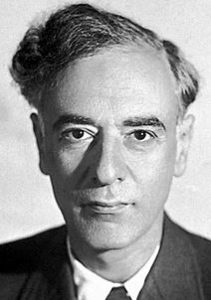
Lev Landau
Edmund Landau is not to be confused with another Jewish math prodigy, Lev Davidovich Landau (1908-1968). Born in Azerbaijan (then part of Russia), Lev Landau started university at 13, published his first paper at 18, and got his PhD in math by 26. He received a scholarship from the Soviet government as well as the Rockefeller Foundation to travel and study abroad. He was soon fluent in German, French, Danish, and English. Much of his time was spent working in the lab of Nobel Prize winner (and past Jew of the Week) Niels Bohr. After returning to the Soviet Union, Landau was put at the head of the physics department at Kharkiv Institute of Physics and Technology. He taught at the University of Kharkiv, and at the same time worked with his student Evgeny Lifshitz on a ten-volume textbook. The Course of Theoretical Physics is still one of the most popular graduate physics textbooks used today. In 1938, Landau was arrested for comparing Stalin to the Nazis. After the intervention of other physicists, he was freed. Ironically, he won the Stalin Prize in 1949 and again in 1953, for his work on building the first Soviet nuclear bomb. Landau is famous for, among many other things, his theory of superconductivity, theory of Fermi liquid, for plasma physics, quantum electrodynamics, and most of all for his theory of superfluidity, which won him a Nobel Prize in 1962. Unfortunately, he couldn’t personally collect the prize because he was in a severe car accident and spent two months in a coma. He ultimately died from his injuries in 1968. Several years before this, his students established the Landau Institute for Theoretical Physics near Moscow. It is still one of the most prestigious physics labs in Russia. Landau was featured in the latest Google Doodle. There is a crater on the moon named after him.
The Torah: A Comprehensive Overview
Words of the Week
Both religion and science require a belief in God. For believers, God is in the beginning, and for physicists He is at the end of all considerations… To the former He is the foundation, to the latter, the crown of the edifice of every generalized world view.
– Max Planck
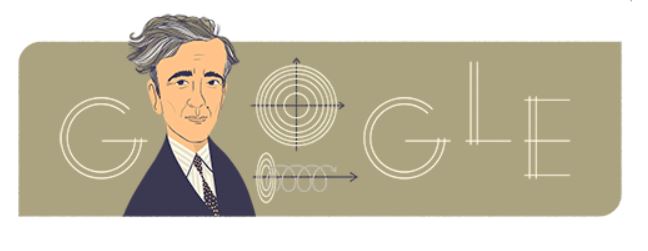
Google Doodle for January 22, 2019, the birthday of Lev Landau.

 Yuri Bentsionovich Milner (b. 1961) was born in Moscow. He studied theoretical physics at Moscow State University before working at the prestigious Lebedev Physical Institute. He found that his abilities in physics were not the best (especially because he was placed on a lower track due to his being Jewish), and decided to switch to business. He first tried selling computers, then went to do an MBA at the University of Pennsylvania, becoming the first person from the Soviet Union to officially study in the US. Upon graduation, he got a job at the World Bank, and in 1995 was made CEO of Russian oligarch Mikhail Khodorkovsky’s investment company. In 1999, Milner read an article and decided it was a good idea to start an online business. He began a series of ventures that brought American-style sites to Russia, including Molotok.ru (the Russian eBay), Boom.ru (free webhosting), and 24×7 (Russia’s Amazon). In 2005, Milner established his own investment fund, Digital Sky Technologies. Five years later, his Mail.ru went public on the London Stock Exchange with a valuation of $5.6 billion. That same year, Milner bought pioneering Israeli instant messaging company ICQ, and has since invested an additional $150 million in Israeli startups. Milner’s venture capital fund has become one of the world’s greatest. He was among the first to invest in Facebook, with an initial $200 million, and plenty more since. He also invested $800 million in Twitter, $125 million in WhatsApp, and $1.6 billion in Alibaba, in addition to Groupon, Snapchat, Airbnb, and Spotify. In 2012, Milner established the Breakthrough Prize, awarding $3 million to great achievements in Physics, Life Sciences, and Mathematics. This is now the largest scientific award in the world, trumping even the Nobel Prize. In 2015, Milner founded the Breakthrough Initiatives to investigate life on other planets. Its first project is a $100 million, 10-year endeavour called “Listen”, searching for radio and laser signals from distant stars with the most sensitive equipment in the world. The most recent Breakthrough Initiative is “Starshot”, investing $100 million to develop a spacecraft that will be accelerated to 20% of the speed of light and take a 20 year journey to our nearest star. Milner also awards (together with
Yuri Bentsionovich Milner (b. 1961) was born in Moscow. He studied theoretical physics at Moscow State University before working at the prestigious Lebedev Physical Institute. He found that his abilities in physics were not the best (especially because he was placed on a lower track due to his being Jewish), and decided to switch to business. He first tried selling computers, then went to do an MBA at the University of Pennsylvania, becoming the first person from the Soviet Union to officially study in the US. Upon graduation, he got a job at the World Bank, and in 1995 was made CEO of Russian oligarch Mikhail Khodorkovsky’s investment company. In 1999, Milner read an article and decided it was a good idea to start an online business. He began a series of ventures that brought American-style sites to Russia, including Molotok.ru (the Russian eBay), Boom.ru (free webhosting), and 24×7 (Russia’s Amazon). In 2005, Milner established his own investment fund, Digital Sky Technologies. Five years later, his Mail.ru went public on the London Stock Exchange with a valuation of $5.6 billion. That same year, Milner bought pioneering Israeli instant messaging company ICQ, and has since invested an additional $150 million in Israeli startups. Milner’s venture capital fund has become one of the world’s greatest. He was among the first to invest in Facebook, with an initial $200 million, and plenty more since. He also invested $800 million in Twitter, $125 million in WhatsApp, and $1.6 billion in Alibaba, in addition to Groupon, Snapchat, Airbnb, and Spotify. In 2012, Milner established the Breakthrough Prize, awarding $3 million to great achievements in Physics, Life Sciences, and Mathematics. This is now the largest scientific award in the world, trumping even the Nobel Prize. In 2015, Milner founded the Breakthrough Initiatives to investigate life on other planets. Its first project is a $100 million, 10-year endeavour called “Listen”, searching for radio and laser signals from distant stars with the most sensitive equipment in the world. The most recent Breakthrough Initiative is “Starshot”, investing $100 million to develop a spacecraft that will be accelerated to 20% of the speed of light and take a 20 year journey to our nearest star. Milner also awards (together with 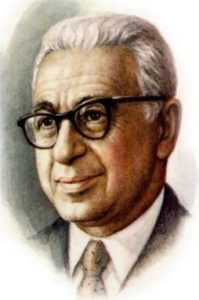 Matvei Isaakovich Blanter (1903-1990) was born in the Russian Empire in a small Ukrainian town. He studied music and became a master pianist and violinist. In the 1920s, Blanter became popular for his dance and jazz songs. After the rise of Stalin, he was “recruited” to write propaganda pieces and composed some of the Soviet Union’s greatest hits. In 1938, he wrote the music for the internationally-acclaimed song “Katyusha”, by far the most well-known Russian tune in the world. (Click
Matvei Isaakovich Blanter (1903-1990) was born in the Russian Empire in a small Ukrainian town. He studied music and became a master pianist and violinist. In the 1920s, Blanter became popular for his dance and jazz songs. After the rise of Stalin, he was “recruited” to write propaganda pieces and composed some of the Soviet Union’s greatest hits. In 1938, he wrote the music for the internationally-acclaimed song “Katyusha”, by far the most well-known Russian tune in the world. (Click 